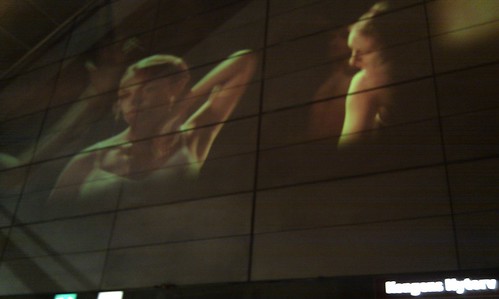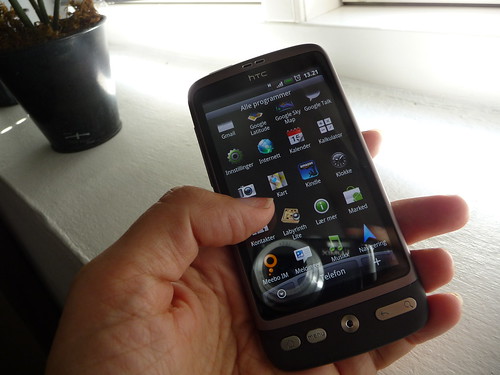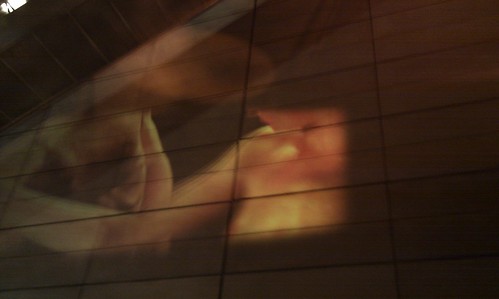From my friend Esther Ewing, a link to some talks published in TED: When games invade real life by Jesse Schell, and The game layer on top of the world by Seth Priebatsch.
Both talks focus on how gaming is becoming the new money-maker, and how it is possible to learn from game design in order to make more and more money. In Priebatsch' presentation the main topic is the connection between farmville and facebook, and how farmville can stop the world. Schell's presentation is a pretty dystopic discussion of a totalitarian surveillance state where game strategies are used to make people serve the system - mainly the commercial system.
Although it doesn't really bring anything new to gaming, these talks are interesting for a few reasons.
First: They don't bother to mention that what we are really seeing is that game designers are using techniques used in advertising since late 1700, not "new and fantastic" strategies developed by game designers. After all, letting people know that games are just doing what PR departments have done since Barnum would not pay as well - nor play as well.
Second: They don't care about the GAME part of gaming, only about the score, grind and production part. Which means they forget what a game is. An example used by Jesse Schell is Lee Sheldon's grading levels, where he lets students level up in class. That's cool, really, the grading systems in most Universities are outdated and inflexible, and doesn't really provide detailed feedback. However, changing the grading system isn't a novel idea! In Sunday school we got gold stars if we were good, and went there to collect those stars. Well, I was bad, so I hardly ever had any, but what's the difference between a gold star and a level, and why is it novel?
Still, it's an interesting way to spend some time, to see how gaming is now an acceptable metaphor for "new ways to make people do what we want, without complaining." Enjoy.
---
Update: I tried to remember where I touch - briefly - on games as totalitarian systems, and it's in the upcoming article in one of the next issues of this year's Journal of Gaming and Virtual Worlds. There, now I pitched myself a little too.
Wednesday, August 25, 2010
Tuesday, August 17, 2010
Desire, art and the metro

This morning it was raining in a far too familiar way, so I decided to get on the metro rather than the bicycle. Cycling is quicker, but I wanted to spend the day at the office fairly dry, so off I went. That turned out to be a really bad decision, since the metro didn't run to where I wanted to go, due to the weather. Yeah.
However, in a way it was a good decision. In Kongens Nytorv, my local station, there's an art installation this week by a group calling themselves Urban Forest. Through music, soft lightening and moving images, they want to turn the otherwise pretty drab and functionalistic metro station into a very different experience.
I watched the flowing images for a minute, cursing myself for leaving the camera behind, when I realised that - hey, I hadn't! After all, in my pocket recided my new übergadget, the new smartphone!

In a few seconds I was clicking away. The connection down at the bottom of the Nytorv station was however too weak to upload, and by the time I had realised my train was never coming, I had to take another and then change at the next stop, and the train at the next stop was never coming and I had to walk, well, uploading was out of my mind.
Still, it's only a few hours later, and I got to upload through the ITU wireless. The pictures were surprisingly good, considering they were taken with a phone in very low light, in the morning rush.

Sunday, August 15, 2010
Moving to Denmark - August edition 2010
In a lot of ways, the move to Denmark has been much smoother and easier than the move (for a year) to Sweden. Most important is probably that I knew both Copenhagen and ITU pretty well, while I had never been to Umeå nor Umu before I went there.
I think one of the things that has made it all much easier, is that I got a personal number, or CPR - central personal registry number (?) right away. With that I got a dancard, which appears to be THE card all danes carry, a health card, and could immediately get the correct taxes and get into the ITU salary rolls. Money is useful stuff.
Next, I knew a lot more people when I arrived to Copenhagen. I have been here a month, and will have to spend a month (well, the week-ends) just inviting people over for dinner to make up for the generousity I have met. In Copenhagen I have semi-adopted family, colleagues I am really happy to meet again after 12 years on the same conference tracks, colleagues I think of as friends and LOVE to hang with, people I have met online who turned out to be fun company, and the Copenhagen members of the guild Tooth and Claw, who showed up at my door, filled my tiny apartment until it was about to burst, and then dragged me out into fresh night air for drinks and geekery. Copenhagen has made me feel welcomed indeed.
While I loved the place I lived in Umeå, I am exstatic about this neighbourhood. I live right downtown Copenhagen, by the both famous and infamous Nyhavn, in a lovely street just busy enough that I feel I live in a city, and peaceful enough that I don't feel any of the aggravation people report from living in cities. There's life, but no mind-wrecking noise making me dream of water on pebbles - the nightly noise of Volda. Well, at least not yet.
School hasn't started yet, but I am to teach two classes, Digital Rhetorics and Digital Culture and Society. I am exited both about the topics and about the people I am to cooperate with: Lisbeth and TL are wonderful people I have always felt inspired by. It makes me want to stretch, and I am looking forwards to engaging with the topics.
There's still a lot to be done, but I now have to leave a large chunk of it to my husband. He has to finish up in Volda, before I can seriously engage with finding a place to live for us all here. Right now there's a buyer's market on property, and if we're lucky, we won't have to turn to begging to get a place we like to live in.
Now, excuse me. I have to go explore what the clapping and cheering is about, at the harbour. It does sound like fun.
I think one of the things that has made it all much easier, is that I got a personal number, or CPR - central personal registry number (?) right away. With that I got a dancard, which appears to be THE card all danes carry, a health card, and could immediately get the correct taxes and get into the ITU salary rolls. Money is useful stuff.
Next, I knew a lot more people when I arrived to Copenhagen. I have been here a month, and will have to spend a month (well, the week-ends) just inviting people over for dinner to make up for the generousity I have met. In Copenhagen I have semi-adopted family, colleagues I am really happy to meet again after 12 years on the same conference tracks, colleagues I think of as friends and LOVE to hang with, people I have met online who turned out to be fun company, and the Copenhagen members of the guild Tooth and Claw, who showed up at my door, filled my tiny apartment until it was about to burst, and then dragged me out into fresh night air for drinks and geekery. Copenhagen has made me feel welcomed indeed.
While I loved the place I lived in Umeå, I am exstatic about this neighbourhood. I live right downtown Copenhagen, by the both famous and infamous Nyhavn, in a lovely street just busy enough that I feel I live in a city, and peaceful enough that I don't feel any of the aggravation people report from living in cities. There's life, but no mind-wrecking noise making me dream of water on pebbles - the nightly noise of Volda. Well, at least not yet.
School hasn't started yet, but I am to teach two classes, Digital Rhetorics and Digital Culture and Society. I am exited both about the topics and about the people I am to cooperate with: Lisbeth and TL are wonderful people I have always felt inspired by. It makes me want to stretch, and I am looking forwards to engaging with the topics.
There's still a lot to be done, but I now have to leave a large chunk of it to my husband. He has to finish up in Volda, before I can seriously engage with finding a place to live for us all here. Right now there's a buyer's market on property, and if we're lucky, we won't have to turn to begging to get a place we like to live in.
Now, excuse me. I have to go explore what the clapping and cheering is about, at the harbour. It does sound like fun.
Subscribe to:
Posts (Atom)



